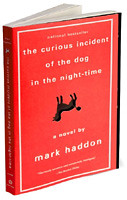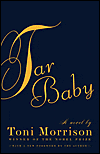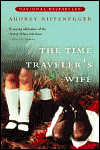The curious poodle she-bang
 One of the books I received for my BDay this year was "the curious incident of the dog in the night time". Like the Joey Pigza series, this is (a) a first-person narrative about a child impaired with a mental disorder (b) living with a single parent, trying to search for the other (c) Very dark. Very enlightening. Very humorous.
One of the books I received for my BDay this year was "the curious incident of the dog in the night time". Like the Joey Pigza series, this is (a) a first-person narrative about a child impaired with a mental disorder (b) living with a single parent, trying to search for the other (c) Very dark. Very enlightening. Very humorous.Unlike the Joey Pigza series, though, the author (Mark Haddon) does not dwell on his particular disorder. In fact, one needs to piece together that the protagonist is autistic (or does he have Aspergers? who knows?) based upon clues Mark sprinkles throughout.
The novel opens with Christopher (the 15 year, 3 month, 3 day old austistic) discovering the neighbour's poodle lying dead in the her front lawn. Emulating his logically-inclined fictional hero Sherlock Holmes (I'm glad he didn't pick Dr Spock!), Chris decides to solve the mystery of the dead dog, leading to some startling secrets (no spoilers here, don't worry).
The novel is peppered with illustrations, puzzles and math problems, breaking the textual monotony. Though I found errors in the author's explanation of the Parade Magazine puzzle and weakness in his explanation of animal population propagation. The Parade puzzle is more interesting, so I'm quoting it here:
You are on a game show on television. On this game show the idea is to win a car as a prize. The game show host shows you three doors. He says that there is a car behind one of the doors and goats behind the other two. He asks you to pick a door. You pick a door but it is not opened. Then the game show host opens on of the doors you didn't pick to show a goat (he knows what is behind each door). He then gives you a final chance to change your mind before the doors are opened. What should you do - should you keep the door you chose or pick the unopened one instead?
According to Mark (or Marilyn vos Savant - who had "the highest IQ in the world"), you should always change and pick the final door, because chances are 2 in 3 that there will be a car behind that door. She shows this by using an event tree with 3 events: choose door with goat, choose door with goat, or choose door with car. Then she shows that if you change, 2 tree leafs lead to getting a car while 1 leads to getting a goat. The fault, in my opinion, lies in the fact that this is a conditional probability. Since we know that one door with a goat has been eliminated, the only two feasible leafs are: choose door with goat and choose door with car. Thus the probability of finding a car is 1 in 2 (50%), not 2 in 3 (66%).
That aside: overall, the book is intelligent, which makes it an engrossing and entertaining read, more so than Joey Pigza. If they make this one a series, I'm in line for the next one...





